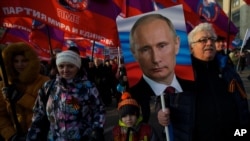The crisis in Ukraine has damaged relations between Washington and Moscow, with some experts believing they are at their lowest point in decades.
Now that the Republican Party controls both houses of Congress, will that have an effect on U.S.-Russia relations?
John Parker, a Russia expert at the National Defense University in Washington, said, “It probably won’t have much of an impact, because the administration was so weak domestically here already that it was factoring in, if not a shellacking at these midterm elections, then a situation in which its domestic support wasn’t any greater.”
Stephen Jones, a Russia expert at Mount Holyoke College in South Hadley, Massachusetts, agreed, saying, “Nothing dramatic will change as a result of this election in terms of U.S.-Russia relations. You will hear perhaps stronger voices from the Senate at times of crisis with Russia, maybe a push to take more aggressive actions in terms of the embargo [i.e., sanctions] that the United States has instituted at some level. But nothing dramatic, I wouldn’t think.”
Robert Legvold of Columbia University in New York said the Obama administration would continue its current policy toward Russia, first and foremost trying to isolate Moscow from the international arena.
“Secondly,” said Legvold, “to maintain the sanctions. And if things go the wrong direction in Ukraine, to increase the pressure for more sanctions, working with the Europeans to do that. And in the meantime, strengthening our defense options in dealing with what we see as an increased Russian threat in central Europe through NATO.”
For his part, former Secretary of State Henry Kissinger told VOA that Russia has to be an integral part of any international system.
“I think even more, now that it is important to find a way to bring Russia and the other countries into a cooperative relationship,” he said.
Looking ahead, experts said Russian President Vladimir Putin would be biding his time, waiting for the next U.S. presidential election in 2016.
In the meantime, Legvold said, there is very little will either in Washington or Moscow to turn the relationship around.
“We are more or less, in our leadership, stuck on the notion that the other side is a fundamental problem, indeed even an adversary, at this point,” he said.
Legvold and others said that same sentiment was prevalent in Moscow.












